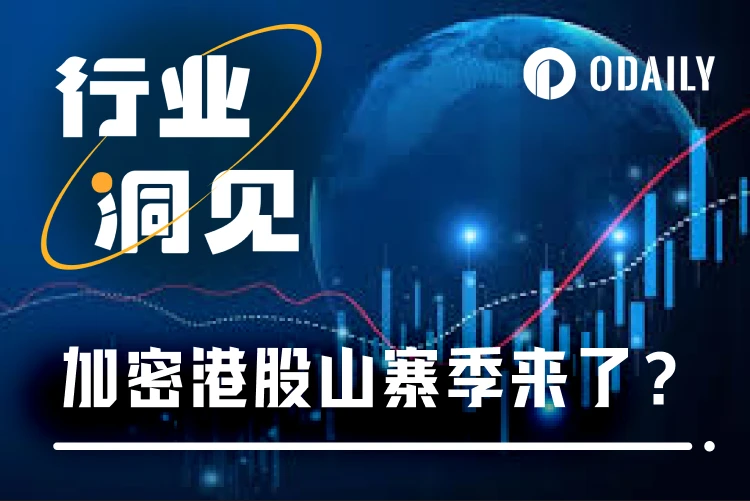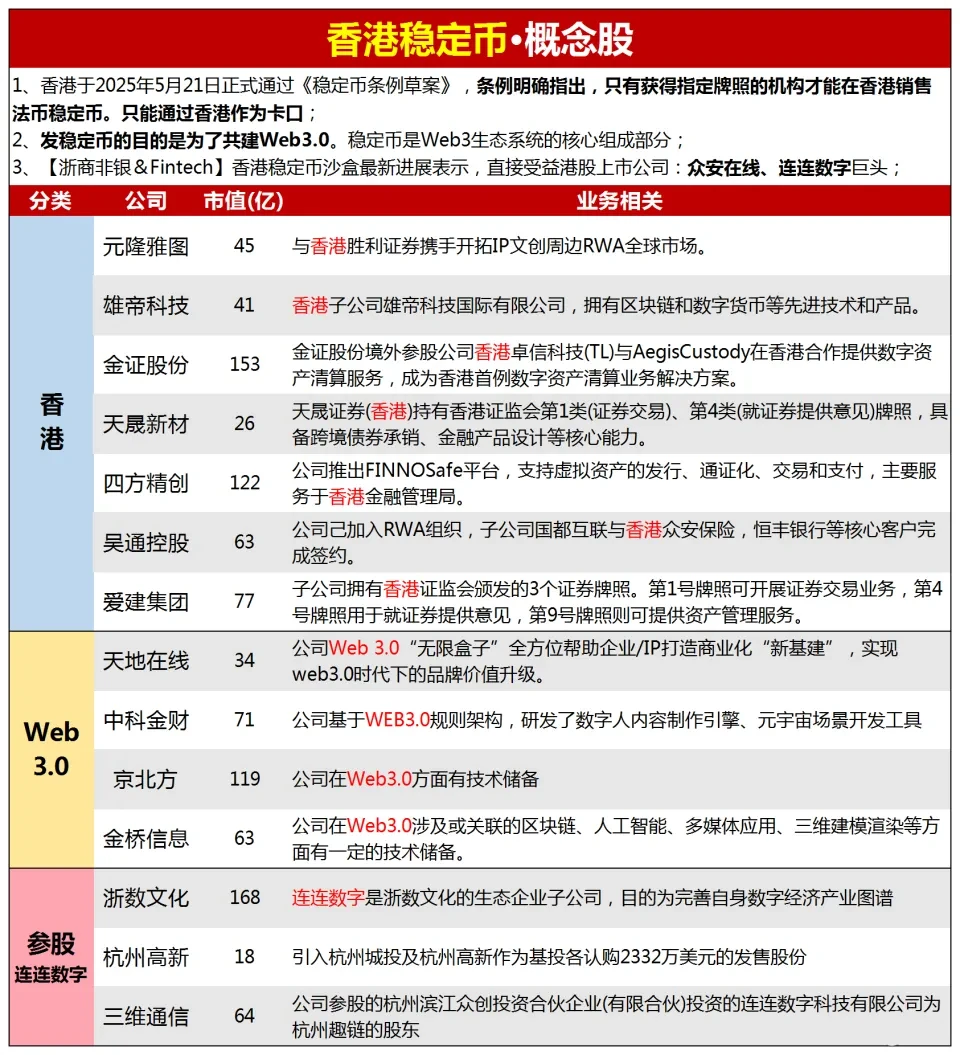The Hong Kong stock market’s alt season is coming. Can crypto concept stocks support the backbone of the bull market?
Bản gốc | Odaily Planet Daily ( @OdailyTrung Quốc )
Tác giả: Wenser ( @wenser 2010 )

After Circle detonated the U.S. stock alt season, Guotai Junan Securities, Tianfeng Securities, Shengli Securities and other securities stocks ushered in a wave of collective pull-ups with the mật mã concept, which was quite similar to the lively scene after the BTC ETF and ETH ETF were approved in Hong Kong. Many people rushed into the market through channels such as Hong Kong Stock Connect or local card opening in Hong Kong, hoping to earn their own bucket of gold in this wave of crypto Hong Kong stock alt season. Despite this, due to policy requirements and capital thresholds, many people still missed this wave of popular stock increases. Odaily Planet Daily will briefly sort out the recent crypto Hong Kong stock alt season in this article and summarize the corresponding entry thresholds for readers reference.
Crypto Hong Kong Stocks Alternative Season: A Chợ Surge Driven by the “Stablecoin Fever”
A closer look at the arrival of the crypto-Hong Kong stock alt season shows that it has experienced three stages of emotional rises, namely, from the initial Circle concept stocks, to the later stablecoin concept stocks, and finally the brokerage crypto concept stocks. After the first stablecoin stock Circle successfully completed its US stock listing and its stock price soared nearly 10 times in just over ten days, and its market value once soared directly to US$40 billion, stablecoins became the latest and hottest narrative target in the crypto market and the traditional stock market. Since then, the alt season no longer lingers in the crypto market, but has moved to the traditional financial market.
The first wave of Hong Kong stock craze: Circle concept stocks
On May 30, the Hong Kong Special Administrative Region Government published the Stablecoin Ordinance in the Gazette, which means that the Stablecoin Ordinance has officially become law.
As a result, digital currency concept stocks in the Hong Kong stock market rose collectively, LianLian Digital once rose 80% during the session, YesCar once rose nearly 50%, and OKEx Cloud Chain once rose more than 45%. As of the close, LianLian Digital still rose more than 60%, OKEx Cloud Chain rose more than 40%, YesCar rose nearly 40%, and ZhongAn Online rose nearly 10%.
In early June, on the eve of Circles listing, China Everbright Holdings (00165.HK), one of Circles early investors, rose by more than 15% on the Hong Kong stock market .
On June 6, China Renaissance Capital (1911.HK), a Hong Kong-listed company, disclosed that its China Renaissance New Economy Fund had invested in Circle in 2018. The company will continue to be optimistic about the development of blockchain technology and actively explore the layout in the fields of Web3.0 and cryptocurrency assets. Lei Ming, a former investor of China Renaissance Capital who was responsible for the investment at the time, nói in an interview that there was a certain element of luck in investing in Circle in 2018. At that time, the latters main business was not stablecoins, and its valuation was only US$3 billion. Now the market value of US$20 billion is somewhat unexpected (June 9). The core judgment of its investment in Circle is that blockchain technology can create very large commercial and social value in the future. The essence of finance is license capability, and Circle happened to be the one with the most licenses at the time.
At that time, Huaxing Capitals share price had risen from 3.55 HKD on June 4 to 4.25 HKD; subsequently, after experiencing a pullback from the lows on June 13 and 23, Huaxing Capitals share price broke through again on June 30, rising to 4.93 HKD, setting a new high for the year.
The second wave of Hong Kong stock craze: Stablecoin concept stocks
As the popularity of stablecoins soars, Hong Kong-listed technology companies such as JD.com and Alibaba have expressed their intention to enter the stablecoin market. Since then, stablecoin concept stocks have become another focus of the Hong Kong stock market after Circle-related stocks.
On June 12, Bloomberg đã báo cáo rằng Ant Group will apply for stablecoin licenses in Hong Kong, China and Singapore. Ant Group responded that it will submit applications as soon as possible after the Stablecoin Bill takes effect on August 1 and the relevant channels in Hong Kong are opened. The news was later confirmed by Bian Zhuoqun, Vice President of Ant Group and President of Ant Digitals Blockchain Business. Influenced by this news, Hong Kong stocks of Ant Financial concept stocks rose sharply . Yunfeng Financial (00376.HK) once soared 98%, and now rose 53%, Lion Teng Holdings (02562.HK) rose nearly 15%, and Yaocai Securities (01428.HK) rose more than 12.5%.
On June 16, Hong Kong stocks related to stablecoins strengthened across the board. As of the close of the midday session, ZhongAn Online (6060) rose by more than 9% in half a day; LianLian Digital (2598), Lianyirong Technology (9959), and China Everbright Holdings (165) rose by more than 10% in half a day; and Yika (9923) rose by more than 7% in half a day.
On June 17, Liu Qiangdong, Chairman of the Board of Directors of JD Group, nói in an internal sharing session that JD hopes to apply for stablecoin licenses in all major currency countries in the world, and then use the stablecoin license to realize exchange between global companies, reducing the global cross-border payment cost by 90% and increasing the efficiency to within 10 seconds. Liu Qiangdong said, Now it takes an average of 2 to 4 days for companies to remit money, and the cost is also quite high. After the B-end payment is completed, we will penetrate into the C-end payment. I hope that one day everyone can use JD stablecoin to pay when consuming around the world. Liu Peng, CEO of JD Coin Chain Technology, also revealed in an exclusive interview with Bloomberg Businessweek Chinese Edition that JDs self-operated e-commerce in Hong Kong and Macau will soon support stablecoin shopping. At the same time, JD nói to the outside world: It is expected to obtain a license in the early fourth quarter of this year and launch JD stablecoin at the same time. JD stablecoin will be issued on the public chain, and anyone can publicly view the issuance volume and other data at that time.
The third wave of Hong Kong stock craze: brokerage crypto concept stocks
After experiencing the first two waves of increases, it was the brokerage channel that once again ignited the crypto-Hong Kong stock alt season.
On June 24, Guotai Junan International (1788.HK) chính thức công bố that it had obtained approval from the Hong Kong Securities and Futures Commission to upgrade its existing securities trading license to provide virtual asset trading services and related opinions. After the upgrade, customers can directly trade cryptocurrencies such as Bitcoin and Ethereum and stablecoins such as Tether on its platform. Guotai Junan International has thus become the first Chinese brokerage firm in Hong Kong to provide a full range of virtual asset-related trading services, covering virtual asset trading, consulting and related product issuance and distribution.
On June 25, the share price of Guotai Junan International rose above 2.5 HKD, up more than 63% in 24 hours.
On June 26, the share price of Guotai Junan International (HK 1788) rose briefly to break through 7 HKD.
On June 26, sources revealed that many local brokerages in Hong Kong (such as Victory Securities, Aide Securities, etc.) have completed the No. 1 license upgrade, and Guotai Junan International is not the only Chinese brokerage to apply for such a license. In the future, more institutions may enter the market for compliant crypto trading services. It is worth noting that the business carried out by the above-mentioned brokerages is a distribution trading service, not a proprietary exchange model. It mainly provides compliant trading channels for mainstream currencies such as BTC and ETH by setting up an omnibus account on a licensed exchange, and does not involve high-risk altcoins. At present, the compliance requirements of these brokerages in terms of customer due diligence, suitability management and investor education are basically the same as those of Guotai Junan International, and all of them prohibit residents of mainland China from participating. At that time, affected by this news, Hong Kong-listed Victory Securities (08540.HK) rose by more than 100% in the short term , closing at 7.69 HKD.
On June 27, people familiar with the matter revealed that the Hong Kong subsidiary of GF Securities Co., Ltd. began to offer tokenized securities with interest in currencies such as US dollars, Hong Kong dollars and offshore RMB. The tokenized securities it launched, which are interest-bearing and redeemable daily, are called GF Mã thông báo. Among them, the US dollar token is based on the Secured Overnight Financing Rate (SOFR), while the interest rates of Hong Kong dollar and RMB products are still unclear. The person said that this token is only available to institutions and professional investors. It can generate interest on short-term idle funds and can also be used to convert between other tokenized assets. The token is issued on the chain and will be traded on Hashkey, a licensed cryptocurrency exchange in Hong Kong.
Since then, the three waves of crypto-Hong Kong stock alt season have been linked together and gradually hit, contributing a lot of trading volume to the Hong Kong stock market; at the same time, the Hong Kong stock IPO market has also been popular among mainland investors, and many people have rushed into the Hong Kong stock market, hoping to make a fortune here.
Hong Kong stock gold rush: the threshold for new listings has risen sharply, and funds and trading volume have become hard limits
Dựa theo the report IPO Market in Mainland China and Hong Kong released by EY in the first half of 2025 , about 40 companies are expected to make their first IPOs in the Hong Kong market in the first half of the year, raising about HK$108.7 billion. The number of IPOs and the amount of funds raised increased by 33% and 711% year-on-year respectively. In the first half of 2025, 70% of new stocks had positive returns on the first day, the same as last year. Since the second quarter, the Hang Seng Index has been on an upward trend, with only four IPOs breaking the issue price.
At the same time, the number of participants in new IPOs has increased significantly: 97% of new shares on the Hong Kong Main Board were oversubscribed in the first half of 2025, an increase of 4 % year-on-year. The average oversubscription multiple was 642, an increase of 3.6 times year-on-year. The oversubscription of Bruco (00325.HK) and Mixue Group (02097.HK) was over 5,000 times, ranking high in the history of IPO issuance.
In June, new stocks were listed more frequently. Several new stocks such as Haitian Flavor Industry (03288.HK), Sanhua Intelligent Control (02050.HK), Chow Tai Fook (06168.HK), and Cao Cao Travel (02643.HK) were listed in a cluster, further stimulating the demand for new stocks.
The first hurdle to gold rush: RMB 500,000 in assets is required to open the Hong Kong Stock Connect
For investors in mainland China, the first way to participate in Hong Kong stock investment is to apply for Hong Kong Stock Connect through mainland securities companies. The main thresholds include:
-
Funding requirements: The average daily assets in the first 20 trading days must be no less than RMB 500,000 (excluding margin trading funds);
-
Risk assessment: must reach C4 (aggressive) or above;
-
Knowledge test: Usually requires 80 points or above, covering Hong Kong stock trading rules and risks.
-
Account and compliance requirements: Must have opened an A-share account with no bad records. Some brokerage firms may require more than half a year of trading experience.
-
Other processes: Risk disclosure statement and entrustment agreement need to be signed.
If you meet the requirements, you can apply for an account through the brokerage APP or offline. Apart from anything else, the hard asset requirement of 500,000 RMB alone has kept a large number of people out of the Hong Kong stock market.
The second stage of gold rush: Hong Kong stock brokers tighten account opening standards
Recently, with the craze of the crypto-Hong Kong stock alt season and the attraction of new Hong Kong stock listings, Hong Kong stock brokers have also tightened account opening standards in response to regulatory pressure and market risk control.
It is understood that leading Internet brokerages such as Futu and Changqiao have collectively stopped mainland users from opening accounts with proof of existing inventory and instead require proof of overseas residence or work, significantly raising the review threshold; some banks in Hong Kong have also simultaneously tightened the qualifications for new stock issuance, and the review process explicitly refuses mainland investors from subscribing to new Hong Kong stocks.
In terms of specific supporting documents, the requirements are relatively complex and strict review standards are set.
A staff member of Futu Securities Hong Kong Branch told the media that the documents that can be used as proof at present include:
-
Electronic statements or advice;
-
Credit card bills;
-
Energy bills (including water, electricity and gas bills);
-
Telephone bill receipts;
-
Insurance policy;
-
Tax bills or other documents issued by government agencies;
-
Overseas housing rental certificate;
-
Proof of overseas property ownership, etc.
The bill or statement document must be issued within three months, and the name, address, issuance time and issuing institution of the individual must be clearly visible. In addition to Futu Securities, many Internet brokerages such as Changqiao Securities and Huasheng Securities have also adjusted their account opening policies and completely cancelled the account opening channel with proof of inventory.
On the other hand, Hong Kong bankers also explained the restrictions on subscription of popular stocks on Hong Kong bank apps, saying that due to the clear provisions in the prospectuses of some new stocks, banks have taken the lead in tightening controls, and it is expected that securities firms may also follow up to strengthen identity authentication measures in the future.
Gold Rush Level 3: Stock Trading Fee Ratio Reduced
In addition to account opening restrictions and subscription restrictions, for Hong Kong stock investors and institutions, stock settlement fees are also a high threshold during high-frequency investment operations.
Previously, the Hong Kong Stock Trao đổis stock transaction fee was minimum HK$2, maximum HK$100, which was a considerable transaction loss for the crypto community who were accustomed to high-frequency buying and selling.
Fortunately, the highly active trading market may provide a potential basis for rule changes, and the Hong Kong Stock Exchange has also shown its sincerity to the market. On June 30, according to tin tức chính thức , the Hong Kong Stock Exchange will implement a new stock settlement fee structure from the 30th, completely breaking the original minimum limit of HK$2 and maximum limit of HK$100. Industry insiders said, This adjustment is related to the policy of lowering the minimum price increase and decrease (the minimum price change unit for buying and selling stocks) in the Hong Kong market. Under the new standard, the cost of small transactions for investors will be greatly reduced.
Specifically, in the past, when conducting small transactions, the transaction costs were relatively high due to the existence of the minimum fee limit. For example, for a transaction of HK$1,000, the minimum fee was HK$2, and the fee ratio was as high as 0.2%. After the adjustment, the fee ratio is 0.0042%, or HK$0.042, which greatly reduces the cost. At the same time, the cancellation of the minimum and maximum fee limits will enable institutional investors to calculate transaction costs more accurately and optimize trading strategies, which will help better control costs when conducting large-scale transactions.
However, after the new regulations, the fees are still collected on both the buyer and the seller side, which is commonly known as taking from both ends.
This is not the first time that the Hong Kong stock market has been hot. The same situation happened again in September and October last year.
It is worth mentioning that the Hong Kong stock market boom had already occurred once in September and October last year, driven by policy dividends.
It is understood that in early October last year, the number of Tiger Brokerage account openings surged by 73.4% in a single week, and the number of active mobile application users increased by 10% year-on-year; Futu Holdings, one of Hong Kongs largest online brokerages, said that the number of account opening consultations in a single week was 40% higher than usual, and the stock trading volume on Futus online platform increased by 95% compared with the previous week, and the number of investors increased by 60%.
What is different is that the proportion of crypto components in this Hong Kong stock boom has increased significantly, and this has a lot to do with the active actions of the Hong Kong government.
On June 29, Hong Kong Financial Secretary Paul Chan Mo-po published a blog post saying that financial technology has great potential in cross-border trade applications, and the goal is to solve the long-standing pain points of slow cross-border payments and high costs, and better serve the real economy in the field of payments. The previously released Digital Asset Development Policy Declaration 2.0, one of the four pillars is promoting application scenarios and cross-sector cooperation, which mentions that stablecoins are cost-effective alternatives outside the traditional financial system and have the potential to bring changes to payment and capital market activities, including cross-border payments. The law on stablecoins will take effect on August 1 this year. The SAR government and financial regulators will strive to create a favorable market environment, with necessary regulatory measures, to encourage issuers to promote the application of stablecoins to different scenarios, helping to solve the real pain points in business and citizens lives.
In the future, as an important part of the global economic system and a financial window connecting the mainland market with the external economy, Hong Kong and the Hong Kong stock market will play an even more important role.
As to whether this wave of enthusiasm can continue, it may depend on more favorable policies and the emergence of encrypted Hong Kong stocks.
Recommended attention:

For reference only, does not constitute investment advice
This article is sourced from the internet: The Hong Kong stock market’s alt season is coming. Can crypto concept stocks support the backbone of the bull market?
Related: CoinW Research Institute Weekly Report (2025.6.23-2025.6.29)
Key Takeaways The total market value of global cryptocurrencies is $3.51 trillion, up 7.98% from $3.23 trillion last week. As of press time, the total net inflow of US Bitcoin spot ETFs is about $48.87 billion, with a net inflow of $2.22 billion this week; the total net inflow of US Ethereum spot ETFs is about $4.18 billion, with a net inflow of $283 million this week. The total market value of stablecoins is US$251.6 billion, of which USDT has a market value of US$157.6 billion, accounting for 62.64% of the total market value of stablecoins; followed by USDC with a market value of US$61.6 billion, accounting for 24.48% of the total market value of stablecoins; and DAI with a market value of US$5.36 billion, accounting for 2.13% of the…







